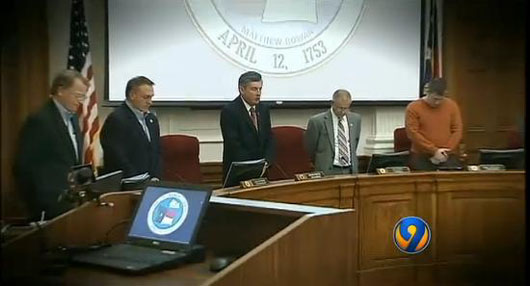by WorldTribune Staff, July 16, 2017
A North Carolina county violated the U.S. Constitution by allowing elected officials to open meetings with a Christian prayer, a federal appeals court said in a divided ruling last week.
The 4th Circuit Court of Appeals in Richmond, in a 10-5 decision on July 14, overturned a ruling by a three-judge panel of the same court that upheld the Rowan County Board of Commissioners’ practice.

After the split decision, the case is likely headed to the U.S. Supreme Court, Reuters reported.
Greg Edds, the Rowan County board chairman, said in an email: “While the decision is certainly disappointing, it is not surprising. (We) will be reviewing it over the next several weeks with our legal team to decide where we go from here.”
Three residents had challenged the Rowan County Board of Commissioners’ practice of opening meetings with prayers composed by elected members, and asking those in attendance to stand and pray together.
Of the 143 prayers in a recent 5 1/2-year period, 97 percent were Christian, the complainants said.
Writing for the 4th Circuit’s majority, Circuit Judge J. Harvie Wilkinson said it was not “inherently unconstitutional” for lawmakers to deliver invocations, but Rowan County violated the First Amendment’s Establishment Clause by focusing on a single, preferred faith.
“The prayer practice served to identify the government with Christianity and risked conveying to citizens of minority faiths a message of exclusion,” wrote Wilkinson.
“Indeed, if elected representatives invite their constituents to participate in prayers invoking a single faith for meeting upon meeting, year after year, it is difficult to imagine constitutional limits to sectarian prayer practice.”
Wilkinson distinguished prior Supreme Court decisions letting Nebraska’s legislature and the upstate New York town of Greece open sessions with prayer led by clergy, rather than elected officials.
Circuit Judge Paul Niemeyer dissented, saying the majority effectively sought “to outlaw most prayer given in governmental assemblies, even though such prayer has always been an important part of the fabric of our democracy and civic life.”
In a separate dissent, Circuit Judge G. Steven Agee said the majority’s approach lets lawmakers “offer only a generic prayer to a generic god.”
Rowan County is about 40 miles northeast of Charlotte.
“Wilkinson’s opinion should be the last word,” said Chris Brook, an American Civil Liberties Union lawyer representing the three residents. “No one should fear being discriminated against because they don’t participate in prayer.”
Letters to the Editor __ Subscribe to Geostrategy-Direct __ Support Free Press Foundation
